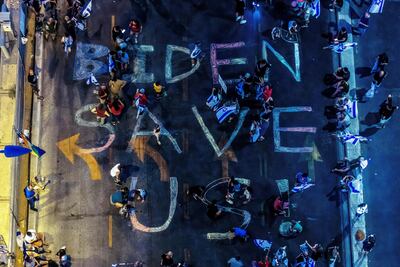Tens of thousands of Israeli protesters took to the streets of Tel Aviv and other parts of the country on Saturday to oppose controversial judicial reforms.
The demonstrations took place days after parliament approved in its first reading a bill that would reduce the "reasonability" clause, through which the judiciary can strike down government decisions.
Prime Minister Benjamin Netanyahu’s government, the most far-right in Israel's history, have proposed changes that would give his allies control over the appointment of judges and the power to overturn court decisions they do not support.
They say the changes are necessary to weaken excessive powers of unelected judges.
But protesters say the plan will destroy the country’s fragile system of checks and balances and concentrate power in the hands of Netanyahu and his allies.
Protester Elad Ziv, 45, a programmer, told AFP the upcoming weeks were crucial in stopping the legal reform.
"We have two and a half weeks to the end of parliament's summer session and we have to block them, otherwise Israel will become a worse place," he said.
Saturday's protests were the 28th since the reform agenda was unveiled in January.

While weekly demonstrations did not seem to be slowing the coalition's legislation, they have allowed support to military reservists who oppose the government's ambitions, Mr Ziv said.
"We do see the protest working in supporting people who are fighting," he said. "The numbers make a difference."
Following international criticism from leaders including US President Joe Biden, Prime Minister Benjamin Netanyahu ordered a "pause" in March to allow for talks on the proposals.
But the cross-party dialogue collapsed in June.
"This is a battle for the country, we want to keep Israel democratic and the dictatorship laws won't pass here," protester Nili Elezra, 54, told AFP.
"Things will be bad. People are already leaving, money is being lost, investors are fleeing, the world doesn't want to talk to us, nobody is happy with what's going on here."
On Thursday evening, thousands of protesters gathered outside the main US diplomatic office in Tel Aviv, calling for the US to condemn Mr Netanyahu’s plan.

The gathering came days after Mr Biden called members of Netanyahu's far-right government “extreme” and said that supporters of Israel's West Bank settlements were “part of the problem”.
Last week, British actress Helen Mirren, who plays Israel's first female prime minister in her latest film, said she has been inspired by the widespread protests against Mr Netanyahu.
Mirren, who portrays the late Golda Meir during the 1973 war between Israel and a coalition of Arab states in “Golda”, told a news conference before the opening of the Jerusalem Film Festival that she was inspired by the protests.
“I’m personally very moved and excited when you see these huge demonstrations,” she said. “I think it’s a pivotal moment in Israeli history.”
Likud activist ejected
On Sunday, Mr Netanyahu ordered the ejection on Sunday of an activist from his Likud party who mocked the Holocaust while heckling anti-government protesters, in remarks that suggested ethnic tensions beneath a constitutional crisis.
Video circulated on social media showed Itzik Zarka, for years a towering figure at party campaign events, cursing and spitting at demonstrators at a traffic junction near the working-class town of Beit Shean on Saturday.
"It's not for nothing that six million were killed," he shouts. "I'm proud that six million of you were burned."
Mr Zarka was, it is thought, distinguishing Mizrahi Jews of Middle Eastern descent — a traditional core of support for the conservative Likud — from the mostly European Jewish victims of the Nazi genocide.
"We will not tolerate such disgraceful behaviour in the Likud movement," Mr Netanyahu said.
Some members of Mr Netanyahu's religious-nationalist coalition have cast the prime minister's push to overhaul the judiciary as redressing elitist overreach by the Askenazi, or European-descended, Jews who dominated the country's founding generation.
The Mizrahim, thought to make up around half of Israel's Jewish majority, have at times complained of discrimination and socio-economic disadvantage.










